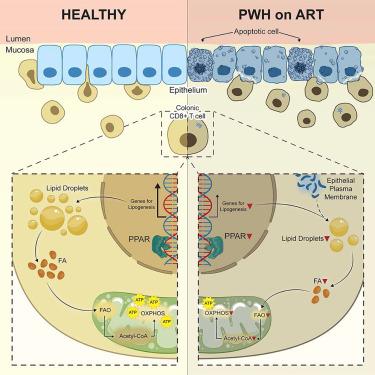Immunometabolic defects of CD8+ T cells disrupt gut barrier integrity in people with HIV
IF 42.5
1区 生物学
Q1 BIOCHEMISTRY & MOLECULAR BIOLOGY
引用次数: 0
Abstract
A hallmark of HIV infection is disruption of intestinal barrier integrity that persists in people with HIV (PWH) despite treatment with antiretroviral therapy (ART). This disruption is central to HIV disease progression, yet the causes remain incompletely understood. We report a mechanism by which immunometabolic defects in colon-resident CD8+ T cells in PWH lead to intestinal epithelial apoptosis and disruption of intestinal barrier integrity. We show that in PWH, these cells downregulate the lipid sensor peroxisome proliferator-activated receptor-γ (PPARγ), which results in reduced intracellular lipid droplets, impaired fatty acid oxidation, and acquisition of lipids by CD8+ T cells from intestinal epithelial cells, which then contributes to epithelial cell death. Our findings indicate that HIV-associated immunometabolic dysregulation of colon CD8+ T cells leads to loss of intestinal epithelial homeostasis. These results identify potential strategies to reduce comorbidities in PWH and other disorders with disrupted intestinal barrier integrity.

CD8+ T细胞的免疫代谢缺陷破坏了HIV感染者肠道屏障的完整性
艾滋病毒感染的一个标志是,尽管接受了抗逆转录病毒治疗(ART),但艾滋病毒感染者(PWH)的肠道屏障完整性仍然受到破坏。这种破坏是艾滋病毒疾病进展的核心,但其原因仍不完全清楚。我们报道了PWH中结肠驻留CD8+ T细胞的免疫代谢缺陷导致肠上皮细胞凋亡和肠屏障完整性破坏的机制。我们发现,在PWH中,这些细胞下调脂质传感器过氧化物酶体增殖激活受体-γ (PPARγ),导致细胞内脂滴减少,脂肪酸氧化受损,CD8+ T细胞从肠上皮细胞获取脂质,从而导致上皮细胞死亡。我们的研究结果表明,hiv相关的结肠CD8+ T细胞免疫代谢失调导致肠上皮稳态的丧失。这些结果确定了减少PWH和其他肠道屏障完整性破坏疾病合并症的潜在策略。
本文章由计算机程序翻译,如有差异,请以英文原文为准。
求助全文
约1分钟内获得全文
求助全文
来源期刊

Cell
生物-生化与分子生物学
CiteScore
110.00
自引率
0.80%
发文量
396
审稿时长
2 months
期刊介绍:
Cells is an international, peer-reviewed, open access journal that focuses on cell biology, molecular biology, and biophysics. It is affiliated with several societies, including the Spanish Society for Biochemistry and Molecular Biology (SEBBM), Nordic Autophagy Society (NAS), Spanish Society of Hematology and Hemotherapy (SEHH), and Society for Regenerative Medicine (Russian Federation) (RPO).
The journal publishes research findings of significant importance in various areas of experimental biology, such as cell biology, molecular biology, neuroscience, immunology, virology, microbiology, cancer, human genetics, systems biology, signaling, and disease mechanisms and therapeutics. The primary criterion for considering papers is whether the results contribute to significant conceptual advances or raise thought-provoking questions and hypotheses related to interesting and important biological inquiries.
In addition to primary research articles presented in four formats, Cells also features review and opinion articles in its "leading edge" section, discussing recent research advancements and topics of interest to its wide readership.
 求助内容:
求助内容: 应助结果提醒方式:
应助结果提醒方式:


